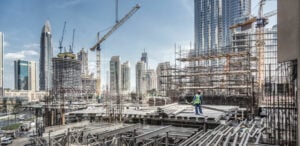
In the current dynamic economic landscape, real estate investments have risen to prominence as a formidable avenue for generating passive income. With thoughtful planning and strategic decision-making, individuals can establish a reliable source of revenue while simultaneously building long-term wealth. In this blog post, we will delve into effective strategies that can help you unlock the potential of real estate for passive income, particularly focusing on the unique advantages of investing in Dubai’s real estate market. Dubai offers a promising pathway to passive income and financial freedom.
By implementing well-researched strategies, setting clear goals, and making informed decisions, you can construct a robust real estate portfolio that consistently generates revenue for the years to come. Embark on your journey towards passive income and discover the immense potential of real estate in Dubai today!
Establishing Investment Goals
In the realm of real estate, having precise objectives is not merely a preference but a necessity. Whether your aim is to secure rental income, capitalize on property appreciation, or plan for retirement, articulating your goals plays a pivotal role in refining your investment decisions. By defining your goals, you can align your investment strategies with your financial aspirations and risk tolerance, ensuring a harmonious approach to wealth building.
Financial Preparation
Before delving into the intricacies of the property market, it’s imperative to ensure your financial groundwork is solid:
- Down Payment: Anticipate saving around 20-30% of the property’s value for a substantial down payment.
- Credit Score: A higher credit score can unlock favorable loan terms and enhance your financing capabilities.
- Leverage: In real estate, leverage allows you to acquire properties with borrowed funds, thus optimizing your return on investment (ROI). However, judicious borrowing within your financial means is essential.
- Budgeting and Emergency Funds: In your financial planning, it’s vital to accommodate potential vacancies or unplanned maintenance expenses to maintain a resilient financial position.
Market Research
Before immersing yourself in real estate investments, a comprehensive market analysis is of paramount importance. This entails a deep exploration of market trends, property values, rental demand, and economic factors specific to your chosen location. These insights serve as the compass that guides your decision-making process and heighten the likelihood of realizing profitable investments.
Defining Investment Goals
Precisely outlining your investment objectives and financial aspirations is a fundamental step. Do you seek short-term returns or aim for long-term wealth accumulation? Determine the level of passive income you intend to generate and set realistic expectations accordingly.
Selecting the Right Property Type
The choice of property type is a critical factor in maximizing passive income. Consider various options, including residential properties, commercial spaces, or vacation rentals. Evaluating elements like location, rental yield, potential appreciation, and tenant demand empowers you to make informed choices.
Leveraging Financing Options
Exploring financing options, such as mortgages or loans, can significantly boost your real estate investment potential. Leveraging other people’s money allows you to enter the market with a smaller initial investment, amplifying potential returns. However, it’s imperative to establish a solid repayment strategy to manage financial obligations effectively.
Professional Property Management
To fully embrace the concept of passive income, engaging a reputable property management company is a strategic move. They assume responsibility for tenant screening, rent collection, maintenance, and various administrative tasks, freeing up your time while ensuring the seamless operation of your investments.
Diversifying Your Portfolio
Risk mitigation and the enhancement of passive income potential can be achieved through portfolio diversification. Investing in different property types or exploring opportunities in emerging markets can provide stability and protection against market fluctuations.
Staying Informed and Adapting
The real estate market is in a constant state of evolution, making it essential to remain informed about industry trends, regulations, and market dynamics. Participation in seminars, networking with professionals, and continued learning about innovative investment strategies are essential components in optimizing your passive income generation.
Understanding Passive Real Estate Investing
Passive real estate investing pertains to the process of directing your capital into diverse real estate ventures managed by experienced professionals or companies, with limited or no direct involvement on your part. This hands-off approach allows you to generate income from real estate assets without the necessity of engaging in day-to-day management tasks, such as tenant interactions, property upkeep, or operational responsibilities.
Advantages of Passive Real Estate Investing in Dubai
Investing in Dubai’s real estate market offers several compelling benefits, including:
A. Potential for Consistent Cash Flow
One of the most alluring aspects of passive real estate investing in Dubai is the potential for a stable and regular cash flow. Dubai offers rental properties and syndications that generate predictable income through rent payments or dividends. This dependable stream of passive income can supplement your income, support your retirement plans, or serve as a financial safety net in times of need.
B. Diversification of Investment Portfolio
Dubai’s real estate properties provide an opportunity to diversify your investment portfolio by including a tangible asset class that has historically demonstrated a low correlation with traditional investments like stocks and bonds. By spreading your investments across various asset classes, you can reduce overall risk and enhance the potential for consistent, long-term returns.
C. Tax Advantages
Real estate investments in Dubai can offer various tax benefits, such as depreciation deductions that allow you to offset a portion of your rental income and reduce your taxable income. Additionally, certain passive real estate investments, like Real Estate Investment Trusts (REITs), often qualify for preferential tax treatment, such as the 20% pass-through deduction under the Tax Cuts and Jobs Act. These tax advantages can contribute to increasing your overall returns and facilitating long-term wealth accumulation.
D. Minimal Time and Effort Required
In contrast to active real estate investing, which demands substantial time and effort for property management, passive real estate investing enables you to reap the rewards of real estate ownership without becoming embroiled in the day-to-day responsibilities. By entrusting the management of your investments to experienced professionals or companies, you can concentrate on other aspects of your life or explore fresh investment opportunities without being bogged down by property management duties.
E. Scalability and Flexibility
Passive real estate investing is distinguished by its high degree of scalability and flexibility. As you gain experience and confidence in your investment strategy, you can easily expand your holdings by incorporating new passive investments or diversifying across various types of real estate assets. This flexibility empowers you to adapt your investment approach to changing financial goals and market conditions, ensuring enduring success in your journey towards wealth accumulation.
In conclusion, Dubai’s real estate market stands as the foremost choice for real estate investment. Its vibrant market, robust economic growth, accommodating regulations, and a host of other factors create an immensely advantageous environment for investors. The potential benefits encompass consistent rental income, tax advantages, and a secure investment climate. Furthermore, Dubai’s world-class infrastructure, strategic location, and cultural appeal contribute to its distinctive and profitable investment landscape.




